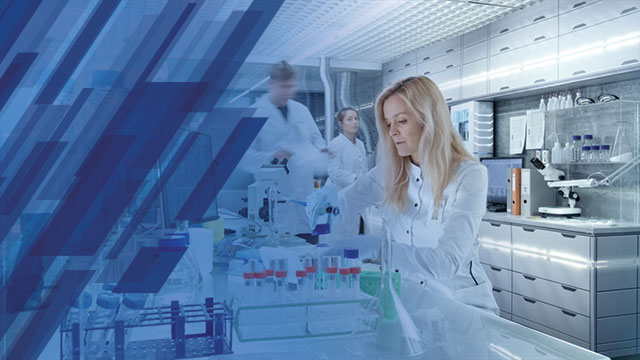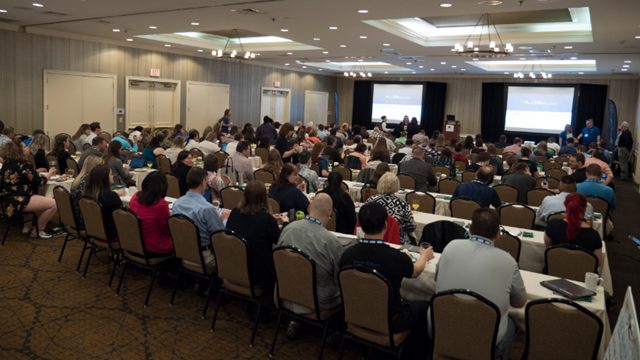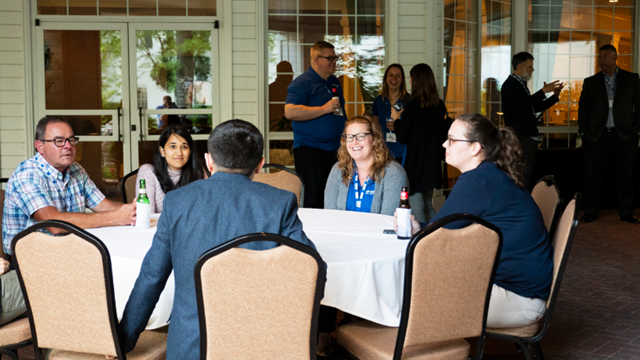Highlights from the 2019 Lab Manager Leadership Summit
Inaugural conference addresses lab managers’ greatest challenges

The inaugural Lab Manager Leadership Summit was held in the Research Triangle, NC from May 13-15, 2019. The sold-out event featured a lab tour of the North Carolina State Crime Lab, which offered a behind-the-scenes look at the inner workings of each department including firearms, toxicology, forensic biology, and digital evidence, followed by a great multi-day lineup of presentations from a variety of expert speakers. The sessions covered everything from how to run an energy-efficient and sustainable lab, to leading teams through proper communication, to ensuring safety in the lab, as well as auditing suppliers and vendors, and innovative lab design.
According to many of the attendees, the Leadership Summit addressed an unmet need by focusing on the day-to-day challenges that arise when managing staff in a lab. The three-day Summit gave attendees an opportunity to meet fellow managers who face similar challenges of communication, training, leading a team, and maintaining a laboratory facility. Most lab managers begin at the bench and work their way through the ranks throughout their career to become managers without much formal managerial and leadership training, meaning they often have to learn as they go. The seven expert presenters each offered invaluable information and tips that attendees could apply to their labs immediately, as well as ways to anticipate and manage conflict or other challenges in the future.
Successful leadership strategies
 The ballroom at the DoubleTree Hilton Hotel in Raleigh-Durham was packed with lab managers eager to learn from the expert speaker presentations.
The ballroom at the DoubleTree Hilton Hotel in Raleigh-Durham was packed with lab managers eager to learn from the expert speaker presentations.
Scott Hanton, general manager of Intertek Chemicals & Materials (Allentown, PA) kicked off the first day of presentations with a session on “Great Leadership and Why it Matters.” Hanton’s extensive expertise on how to effectively work with peers, resolve conflict, and be a true example of a leader left attendees eager for more.
The baseline of being a good leader begins with being a good human. As Hanton explained, “people are our most important resource,” so if your employees find you trustworthy, loyal, and helpful, they are more likely to be actively engaged at work. Hanton went on to list 13 traits and skills that can be applied to successful leadership, such as genuine caring, active listening, creating a vision, enabling growth, and good decision-making, to name a few. He also advised attendees to “manage by walking around.” According to Hanton, when lab managers engage, check in on staff, and ask them what they are up to or if they need anything on a regular basis—as opposed to staying in their office throughout the day—it shows an extra level of involvement and enables the lab manager to stay on top of everything going on in the lab. In quoting Melanie Klinghoffer, Hanton said, “If you care, they’ll care!”
Attendee Jared Walter, a quality control lab manager, mentioned that he appreciated Hanton’s presentation in particular, and was able to identify a few key things that he can now develop on his own to become a better leader. “A couple quotes that stood out to me were: ‘True leaders don’t create followers, they create more leaders’ and ‘the role of a leader is to build a network of trust,’” said Walter.
Hanton also provided helpful advice on communicating with staff. One example was a point he made on how to handle assertive behavior or difficult interactions. Posing the simple question of “Did you intend to hurt my feelings?” to a colleague is a direct way to clarify what they truly meant to say, and provides an opportunity for those involved to think comprehensively about how they may be perceived by others.
Running a safe, efficient lab
The main message of Dennis Terpin’s presentation on developing a higher safety conscious was simple: “See something, do something.” Terpin, PhD, is a retired senior industrial hygienist and emergency manager at the University of Illinois, Chicago. He has nearly 50 years of experience in the lab safety and emergency management/response fields. He stressed the importance of developing lab-specific safety plans and identifying all potential hazards associated with every lab process. Some lab duties can become repetitive, but as Terpin noted, “nothing is routine” in the lab when it comes to possible hazards.
Allison Paradise, CEO of the nonprofit My Green Lab, offered a wealth of knowledge on sustainable practices that every lab manager can implement at their facility. Inspired early in her career to resolve the problem of massive excess waste generated by laboratories, Paradise has since led major efforts through My Green Lab to develop the first nationally recognized standard for laboratory operations, establish the first ENERGY STAR category for laboratory equipment, and most recently, released the first line of eco-labels for laboratory products. During her presentation, Paradise outlined four key areas where labs can improve their sustainability practices: disposal, energy, water, and chemicals. For example, changing -80 C freezers to -70 C can save 30 to 40 percent of a lab’s energy usage, and the freezer’s compressor is less likely to fail. She also identified a few companies and organizations who have launched programs to help labs better manage their energy and waste. For example, companies like MilliporeSigma and Thermo Fisher Scientific now offer paper coolers as an alternative to Styrofoam, and NJ-based company TerraCycle provides a variety of free recycling programs for hard-to-recycle waste. My Green Lab’s new ACT (accountability, consistency, and transparency) eco-labels resemble nutrition labels that consumers are used to seeing on food products, but the ACT labels break down the environmental impact of specific lab supplies and equipment. The labels, which can be found on hundreds of products, allow managers and scientists to make smarter purchasing decisions.
“The Lab Manager Leadership Summit was attended by a smart, thoughtful audience. It was great to see so many lab managers engaged with laboratory sustainability,” said Paradise.
Building relationships with your lab’s vendors and suppliers was also a topic of discussion, led by Joy McElroy, director of Training and Business Development at Maynard Consulting Company. McElroy explained how to prepare and plan for regulatory compliance audits, and how to properly write out an audit report. Giving your vendor or supplier proper notice of an audit visit is a must, and taking notes of things you observe while touring the facility that you can refer back to is another important step, according to McElroy. Your audit visit experience will determine if a specific vendor or supplier is right for you.
 Attendees had the opportunity to meet fellow lab managers and learn about their facilities during the first evening's cocktail reception.
Attendees had the opportunity to meet fellow lab managers and learn about their facilities during the first evening's cocktail reception.
Mark Paskanik, architect and lab design expert at CRB, closed out the first day of presentations by teaching attendees about the latest trends in laboratory design. One of the most popular current design trends revolves around mobile casework, which allows managers to be flexible with their lab’s layout as needs change and as equipment evolves. Paskanik also stressed the importance of utilizing natural sunlight, and strategically designing your new lab space to get the most out of its footprint.
On the final day of the Summit, Beverly Tyler, professor of management, innovation, and entrepreneurship at North Carolina State University, got attendees engaged in a fun presentation entitled, “Herding Cats: Managing a Highly Trained and Knowledgeable Staff.” Tyler opened our eyes to the many behavioral traits that cats and scientists have in common. Afterwards, she conducted an exercise that allowed attendees to discuss some of these traits and how they relate to challenges when dealing with an interdisciplinary group of scientists.
Rick Parmely, founder of Polished and Professional LLC, wrapped up the event with his session on “Leading Through Effective Communication.” He highlighted some of the most impactful points from each presentation, and offered his own unique insight on how to ensure a collaborative, well-functioning lab environment through clear communication and honesty. “I enjoyed the Leading Through Effective Communication presentation and it’s five key critical steps to show commitment to trust. The quote I took away from that presentation was that ‘you give respect by listening; you earn respect with honesty,’” said attendee Brian Rice, an ICP-OES, FES, and QSA supervisor.
Networking for lab managers
In addition to the interactive presentations, another major benefit of the Summit was the opportunity for attendees to connect with colleagues and share ideas amongst each other.
The beautiful spring weather and lush green grounds surrounding the Summit’s venue at the Doubletree Hilton Hotel in Raleigh-Durham offered the perfect backdrop for attendees to socialize during each evening’s cocktail receptions. The casual environment encouraged attendees to relax and share stories and insight with fellow lab managers who they may have otherwise never met. The Summit attracted individuals from all over the US and beyond, including Ghana, Singapore, and Malaysia, representing a diverse group of labs.
During coffee and lunch breaks, attendees could visit with exhibitors to learn about new products and equipment, or chat with the expert speakers for additional insight. “One of the most important things to me about the Leadership Summit was the interaction between the attendees,” Hanton said after the Summit. “The very thoughtful questions from attendees sparked really useful discussions during the networking time.”
The first-ever Lab Manager Leadership Summit was a great success, and the Lab Manager team is already looking forward to seeing returning attendees and new faces at next year’s event. If you missed out on this year’s Summit, you can register for updates on the 2020 Summit here.
 Attendees mingle during the cocktail reception on the final night of the Leadership Summit.
Attendees mingle during the cocktail reception on the final night of the Leadership Summit.

